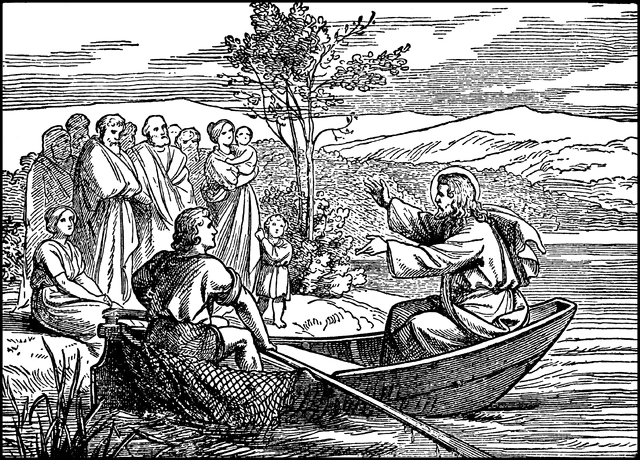
So when they had brought their boats to land, they forsook all and followed Him.
Sometime in the last several decades – I can’t pinpoint exactly when – Christians began referring themselves as “followers of Jesus.” Like all these linguistic movements, they sort of creep up on you. You notice it for a first time, probably having heard it several times previously but it not registering. Then it sticks out, either for good or for ill – you either like the way it sounds or it grates on you. If you like it, you may begin using the word or phrase yourself. If you don’t, you’ll probably keep your thoughts to yourself because, after all, it’s usually not wrong per se, just different. And you tell yourself your reaction is because you’re predisposed to be conservative on these things and perhaps you should not be so close minded.
But then this happens. Eventually the new word or phrase passes a tipping point, and all the cool people say it, and if you don’t say it, you’re not a cool person. But here’s the thing about cool people and coolness. It’s full of paradoxes. To be labeled “cool” is to be labeled – to have a label – and being labeled is the antithesis of being cool. For what is being cool but to be ahead of the curve, your own person, doing your own things, being beyond labels. And who are the “cool” but those who follow some popular trend. So, by the time the original cool people have moved on to the next cool thing, the people following them, claiming to be cool, are in fact sort of dorky.
So, eventually the word or phrase will be found on some snarky website under a listicle article like, “Ten Overused Words from Christianity, Inc.” And then the only way people can even speak the “new” phrase is ironically, or precede use of it saying something like, “I know this phrase is overused, but…” And then it eventually goes into disuse, thankfully.
And then the conservatives wonder why they didn’t speak up in the first place and help all the would-be cool people avoid all the fuss.
“Followers of Jesus” is one of those phrases. It’s a phrase arising out of non-denominationalism, which itself is a Gnostic tendency, that is, a tendency to abstract the “essence” of Christianity from its formal qualities like doctrine and worship forms. “It’s not about what doctrines are knocking around in your head; it’s not about how you worship; it’s about a relationship with Jesus.” Well, golly, but what does that mean?
I have expressed before exactly what this means. It means you have an imaginary friend named Jesus, who is nothing more than a projection of, at worst, your personal desires, at best, your personal interpretation of Scripture, which may or may not be the proper interpretation of Scripture and probably more often than not is your personal desires mustering Scripture to support what it wants (either positively or negatively – yes, there’s some subtle psychology going on here).
Being a “follower of Jesus” arises from this dynamic. You’re not Lutheran or Presbyterian. That suggests you bend the knee to some dogma christened by some church of mere men. You’re not “non-denominational.” That’s too technical and “label-y.” So also is “evangelical,” which borders on being accurate, which is exactly what “Baptist” is. (Every time I here someone say, “I’m just a follower of Jesus,” I think to myself, “Oh. Huh. So you’re Baptist.” To which I then think, “Do you follow Jesus when He says, “This is My Body…This do”?)
Furthermore, another dynamic is at work, and this goes back to how coolness works, and how coolness works is actually a species of how Gnosticism works. The word “hip” comes from black jazz culture, the word “hep,” and it means “in the know.” Those who are hip, or hipsters, or hippies, are the cool ones. They are “in the know” about the frontiers of where History is “progressing.” But the nature of gnostic progressivism is, it’s always out of reach. Yesterdays utopian standards, supposedly met by the “hip” become today’s “stale, bording on fascist, ideas of the past.”
Evangelical movement is always of this nature. Every new articulation of evangelical movement believes itself the “authentic” manifestation of Christianity, unbeholden to the ways of the past. Here, the past is always evil, wrong, Pharisaical, hypocritical, institutional, and so on. The past is always something to rebel against, because each new age – usually corresponding to when youth discover some new idea from the latest, greatest prophet, who now has the medium of the internet to proclaim his wonders – is deemed the authentic, true version of Christianity. Fundamentalism gave way to evangelicalism gave way to the Church Growth movement gave way to the mega-church movement gave way to the Emergent Church movement gave way to who knows whatever is going on in trendy evangelical circles today.
And along the way, somehow, “I’m a follower of Jesus” became the proper way to designate yourself as a Christian.
What exactly is a follower of Jesus? It’s someone who is baptized and believes. It’s a member of the Church. It’s someone who has repented of sin and looks to Christ for salvation. It’s someone who hears and submits to Christ’s word first in the Gospel but also in the whole Bible. In evangelical circles it almost always means something in the way of sanctification, however sanctification is defined in any given moment. That can be puritanical sexual ethics on one side, or steadfast care for the underprivileged on the other. Whatever it is, it’s about what one does. Following Jesus means to do something.
Here’s the thing. Jesus says very little about both sexual ethics and care for the underprivileged. He says a whole heck of a lot, however, about His kingdom, Himself, and the salvation He’s bringing. A follower of Jesus, quite frankly, will be steeped in Jesus’ teaching. He will be a theologian of Christology. Yes, he will have the correct views on sexual and poverty issues, which we all know. But you don’t need a Jesus to have these views. You do, however, need a Jesus to have Christology – obviously!
When Jesus bade Peter to follow Him, it was a call to go to seminary and spend three years learning at His feet. When Jesus bade the crowds to follow Him, it was to take up the cross, that is, be baptized into the faith, and take up the burden of faith. The early Christian Church wasn’t persecuted for being loving, or because they had strict sexual ethics. They were persecuted because they confessed Jesus Christ as Lord of lords and King of kings, the only way of salvation.
Is this what people mean today when they say “I’m a follower of Jesus”? Perhaps, but if that’s the case, you’d expect a bit more focus on doctrine, His Church, His sacraments, the baptismal life under the cross, and things that actually require Jesus than you would on do-gooderism defined in ambiguous ways. A Christian is not a follower of “biblical principles” or “biblical ethics.” He is someone baptized in the name of the Lord and who hangs on Jesus’ every word.
I often challenge people to actually read the Gospels and ruminate on what Jesus actually says. It ought to surprise them, because what Jesus teaches and Who Jesus is – and what it means to follow Him – is something completely “other” than some trending designation current to this age.
How then should Christians designate themselves? How about “Christian”? This is how the martyrs answered when asked. “I am a Christian.” Of course this needs to be spelled out often. But the good thing about “Christian” as opposed to “I’m a follower of Jesus” is, the former is a label, implying something has been done to you, whereas the latter begins with the almighty “I.”
The almighty “I” can always be challenged – “Really? Do you always follow Jesus?” “Well, not always, but I try.” Whereas “Christian” is a label that sticks – “I was baptized Christian and am forgiven. Self-understanding resting on “I” sustains so long as “I” sustains, which is wobbly. Self-understanding resting on what one is given – the name of Christ in baptism – is most certainly sure.








